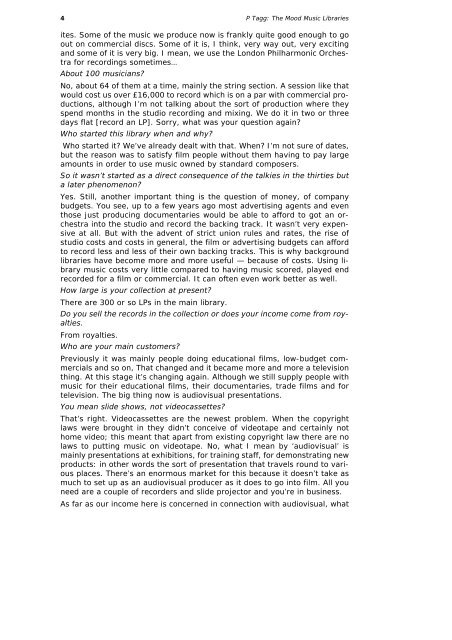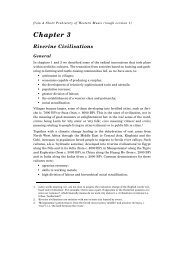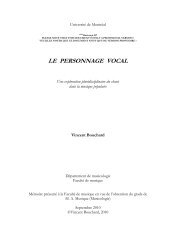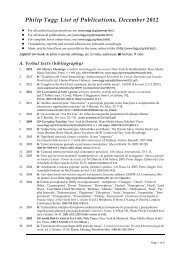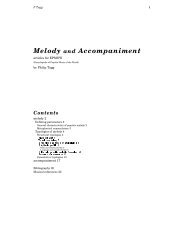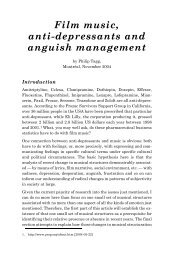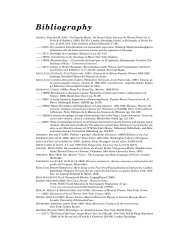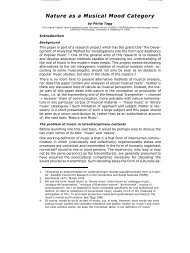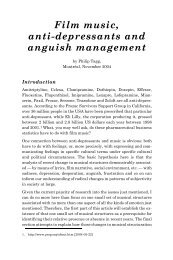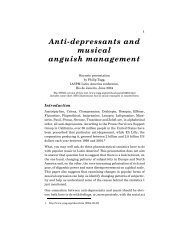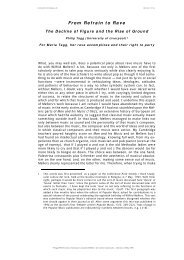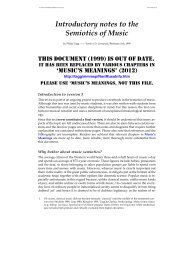interviews with library music producers - Philip Tagg
interviews with library music producers - Philip Tagg
interviews with library music producers - Philip Tagg
You also want an ePaper? Increase the reach of your titles
YUMPU automatically turns print PDFs into web optimized ePapers that Google loves.
4 P <strong>Tagg</strong>: The Mood Music Libraries<br />
ites. Some of the <strong>music</strong> we produce now is frankly quite good enough to go<br />
out on commercial discs. Some of it is, I think, very way out, very exciting<br />
and some of it is very big. I mean, we use the London Philharmonic Orchestra<br />
for recordings sometimes…<br />
About 100 <strong>music</strong>ians?<br />
No, about 64 of them at a time, mainly the string section. A session like that<br />
would cost us over £16,000 to record which is on a par <strong>with</strong> commercial productions,<br />
although I’m not talking about the sort of production where they<br />
spend months in the studio recording and mixing. We do it in two or three<br />
days flat [record an LP]. Sorry, what was your question again?<br />
Who started this <strong>library</strong> when and why?<br />
Who started it? We’ve already dealt <strong>with</strong> that. When? I’m not sure of dates,<br />
but the reason was to satisfy film people <strong>with</strong>out them having to pay large<br />
amounts in order to use <strong>music</strong> owned by standard composers.<br />
So it wasn’t started as a direct consequence of the talkies in the thirties but<br />
a later phenomenon?<br />
Yes. Still, another important thing is the question of money, of company<br />
budgets. You see, up to a few years ago most advertising agents and even<br />
those just producing documentaries would be able to afford to got an orchestra<br />
into the studio and record the backing track. It wasn’t very expensive<br />
at all. But <strong>with</strong> the advent of strict union rules and rates, the rise of<br />
studio costs and costs in general, the film or advertising budgets can afford<br />
to record less and less of their own backing tracks. This is why background<br />
libraries have become more and more useful — because of costs. Using <strong>library</strong><br />
<strong>music</strong> costs very little compared to having <strong>music</strong> scored, played end<br />
recorded for a film or commercial. It can often even work better as well.<br />
How large is your collection at present?<br />
There are 300 or so LPs in the main <strong>library</strong>.<br />
Do you sell the records in the collection or does your income come from royalties.<br />
From royalties.<br />
Who are your main customers?<br />
Previously it was mainly people doing educational films, low-budget commercials<br />
and so on, That changed and it became more and more a television<br />
thing. At this stage it’s changing again. Although we still supply people <strong>with</strong><br />
<strong>music</strong> for their educational films, their documentaries, trade films and for<br />
television. The big thing now is audiovisual presentations.<br />
You mean slide shows, not videocassettes?<br />
That’s right. Videocassettes are the newest problem. When the copyright<br />
laws were brought in they didn’t conceive of videotape and certainly not<br />
home video; this meant that apart from existing copyright law there are no<br />
laws to putting <strong>music</strong> on videotape. No, what I mean by ‘audiovisual’ is<br />
mainly presentations at exhibitions, for training staff, for demonstrating new<br />
products: in other words the sort of presentation that travels round to various<br />
places. There’s an enormous market for this because it doesn’t take as<br />
much to set up as an audiovisual producer as it does to go into film. All you<br />
need are a couple of recorders and slide projector and you’re in business.<br />
As far as our income here is concerned in connection <strong>with</strong> audiovisual, what


